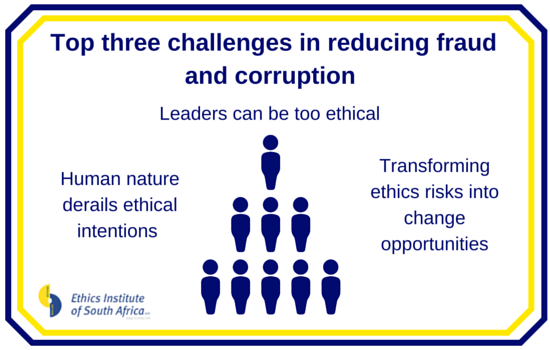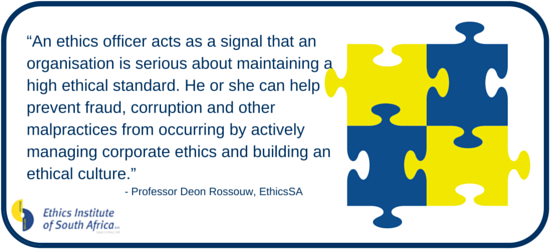|
Being too ethical, human nature, and transforming ethics risks into change opportunities are three major challenges in reducing fraud and corruption. These challenges were highlighted at the recent 8th annual Ethics Officer Learning Forum.
The event was hosted by the Ethics Institute of South Africa (EthicsSA); currently the only organisation in South Africa that train Certified Ethics Officers. Since 2004 a total of 1093 delegates have completed theoretical training, with 498 completing the practical component that is required to become a Certified Ethics Officer. “Ethics officers are charged with the planning and execution of activities that reduce fraud and corruption, but that also build an ethical organizational culture,” said Prof Deon Rossouw, CEO of EthicsSA. “The purpose of the annual Ethics Officer Learning Forum is to bring Ethics Managers together to learn from one another.” Leaders can be too ethical “The ethical leader is not a moral saint to be feared and excluded by others,” said Tom Beale, a consultant in the field of governance, ethics and compliance. “A good ethical leader is someone that is genuinely concerned with finding a sound balance between the interests of the self and others. This will usually be evident in their strive for creating a workplace that is both ethical and enjoyable.” Beale advises against leaving ethical conduct up to complying with laws, procedures and guidelines like the King Code of Governance. A more effective approach is to use ongoing training to entrench ethical habits and behaviours, after which compliance to rules and regulations will usually follow. Plan for human nature to derail ethical intentions “The purest ethical intentions supported by the best ethics training will be challenged by our human nature,” said Paul Vorster from JVR & Associates. Ethical conduct means different things to different people, and when faced with ethical dilemmas people will act based on their own morals and values. Employers assuming that the morals and values of employees align with the ethical goals of the company face huge ethics risks. Convert ethics risks into opportunities for change An ethics risk is a situation that could force those involved to have to choose between acting ethically and getting a job done in an unethical manner. With relevant training, employees will know how to confidently act in the best interests of the greater good, themselves or the organisation they represent. “Risk contains both danger and opportunity,” said Lea Annandale-Dippenaar, an ethics and enterprise risk management advisor. “Ethics risks hold opportunities for organisations to develop, grow and teach their employees to develop finer skills in managing and reducing ethics risks.” ENDS MEDIA CONTACT: Juanita Vorster, 079 523 8374, [email protected], www.atthatpoint.co.za For more information on EthicsSA please visit: Website: www.ethicssa.org LinkedIn: Ethics Institute of South Africa Facebook: Ethics Institute of South Africa Certified Ethics Officers can prevent further increase in unethical conduct“Talking about fraud and corruption isn’t going to prevent it from happening,” says Professor Deon Rossouw, CEO of the Ethics Institute of South Africa (EthicsSA). “We need to train people in preventing unethical conduct.”
Certified Ethics Officers are qualified to develop codes of ethics and to assist organisations in ensuring that all their stakeholders are familiar with, and adhere to their codes of ethics. “An ethics officer acts as a signal that an organisation is serious about maintaining a high ethical standard,” says Rossouw. “He or she can help to prevent fraud, corruption and other malpractices from occurring by actively managing corporate ethics and building an ethical culture.” Ethical conduct revolves around actions that balance self-interests, the interests of others, and the greater good. “Navigating tricky ethical issues is something that requires professional expertise—common sense on its own is no longer a reliable guide,” warns Rossouw. “Training and certification are absolutely essential to ensure that an ethics officer is empowered and can deliver the maximum business value.” “Qualified ethics officers will know how to act as helpline for employees on all ethical issues,” says Rossouw. “With appropriate training, they can also analyse an organisation’s whistle-blowing data to look for trends and implement preventative measures against unethical conduct.” EthicsSA is currently the only organisation that offers certified Ethics Officer training in South Africa and in Africa. A list of Certified Ethics Officers is available from http://bit.ly/ethics-officers ENDS MEDIA CONTACT: Juanita Vorster, 079 523 8374, [email protected], www.atthatpoint.co.za For more information on EthicsSA please visit: Website: www.ethicssa.org LinkedIn: Ethics Institute of South Africa Facebook: Ethics Institute of South Africa |
Welcome to the newsroom of The Ethics Institute. For media releases prior to August 2014 please click here.
Archives
August 2017
Categories
All
|



 RSS Feed
RSS Feed